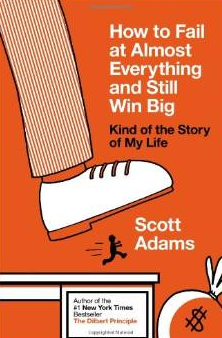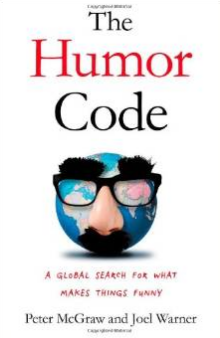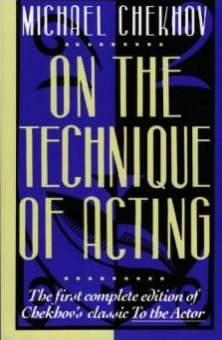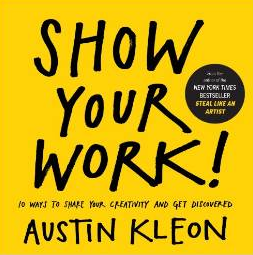I recently read “You’re Lucky You’re Funny: How Life Becomes a Sitcom” by Phil Rosenthal. Below are the quotes I found most interesting. As always, if you like the quotes, click here to buy the book.
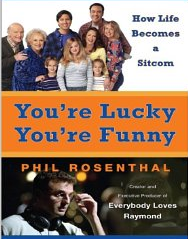 “Almost every experience I’m writing about here will somehow be used later. You’ll see. And what you’ll also see is that as you go through life as a writer, it’s easier to write thing down than to actually write.” (56)
“Almost every experience I’m writing about here will somehow be used later. You’ll see. And what you’ll also see is that as you go through life as a writer, it’s easier to write thing down than to actually write.” (56)
“Then there are the people who are running shows who have no business doing that because they are not ready to run a show yet. They were on staff of a hit show and sold a pilot. But they don’t know what they’re doing and don’t know what they want and they’re operating from fear and nervousness. Their minds are changing all the time because they just don’t know what they want. Or they’re listening to the network’s or the studio’s notes and assuming they know what they want. you have to know what you want.” (62)
“The single best piece of advice I ever got from anyone about anything. It was from Ed Weinberger. He said, ‘Do the show you want to do, because in the end, they’re going to cancel you anyway.’” (67)
“There are umpteen factors you can’t control. So you have to make sure the ones you can control are so fantastic, they trump the ones you can’t. Your show has to be undeniable.” (70)
“The networks don’t like what’s called a premise pilot – one where the premise of the series is established – because it’s not indicative of what the other episodes will be like. They want an episode that could be episode number two or twelve or thirty.” (80)
“Comedy isn’t just comedy, it’s clarity. Without that clarity, you’re only funny to yourself.” (100)
“We started with a few rules in The Writers’ Room:
Could this happen?
No topical jokes.
No B stories.” (101)
“At the end of the day, you know the best way to reconcile your feelings with people who’ve done you wrong? Just keep this in mind: They have to be them. That’s their punishment.” (125)
“There are dry-erase boards all around us on the walls. One board has the places we order lunch from. One has the places we like to go out to. One board has words that Ray can’t pronounce, and the way he actually does pronounce them, which come out of his mouth sounding like Einsteen and mispronunctuation. Another board is titled “Ray’s Surprise Vocabulary” and has some lofty words Ray has actually used correctly in a sentence, like “sharecropper.”
Several boards have the name and number of every episode we’ve done so far, so that when someone has a great idea, someone else can usually point to the board and say, “Number sixty-seven, you moron. We did it already.” And then there are teh boards with the color-coded ideas. And these colors actually mean something, not like the government with its terror alerts. A certain color indicates this is just an idea. Another color might indicate we got somewhere on that story – we have actual notes on it. And another color means it was turned into an outline already, which means we’re doing it. If we’ve already gotten to the outline stage, it’s very rare that we’ll throw it out.” (132-133)
“We were always looking for the deeper meaning in every story, something that would have some kind of resonance with the audience, no matter how silly on the surface.” (140)
“Half the day is working on future shows, and the other half is this week’s show.” (140)
“No matter how seemingly silly the episode was, we felt the need to tie each one down to some sort of emotional underpinning, something that would resonate with the viewer after the show was over.” (167)
“The best note I ever received as an actor I got when I was doing too much on stage – you know, trying to be funny… she said, ‘It was very good, but let them come to you.’
‘Let them come to you’ means just be. Don’t playact at being the character, just be the character. Just be. Just live. Don’t push. So that applies to everything. It’s one of those notes that applies to everything in life. Let them come to you. Just be. Just be you. Don’t push; they’re going to like you at the party. It’s going to be fine. We tend to like people who are real and believable and are like us. It doesn’t mean you don’t do anything, but you don’t push it. You don’t show the audience that you’re doing an action. ‘Look how I brush my hair away from my face so slowly to show I’m really interested in what the other actor is saying’ – you just are interested. Same in writing.” (170-171)
“Everyone in our cast had it. The deadpan look. To me the golden key in comedy is: They know what you’re thinking. That’s what we take so any pauses in the show. So that the look will get the laugh because the audience, once the characters have been established, knows what Robert is thinking when Ray gets a big homemade cake from Mom. And we know what Debra is thinking. And Frank. And Marie and Raymond.” (171)
“It’s all a struggle toward simplicity and clarity – from the writers’ story, to the show in front of the live audience, to the show as broadcast on television.” (174)
“Sometimes it’s a goddamn struggle to figure out what an episode is about. What is it about? That’s at the bottom of everything. What is it about. What is this scene about? What is this line about? What is this word about? Or, is it worth stopping the scene for that joke? What if it doesn’t advance the story – and not every line has to advance the story – we are in the comedy business – but is it worth stopping for Frank to insult his wife at this moment? Usually, you bet it is. Everyone has his or her part to play. Everyone has his or her character that we look forward to seeing.” (174)
“You have to justify every action and attitude the character takes, or they don’t make sense.” (175)
“It’s good writing if the setup is funny in and of itself. Then the audience doesn’t know they’re being set up – that’ sa good setup. It’s not dry, it’s not boring, it’s not what we call “pipey” – as in, it’s so obviously information that the audience needs to know just to understand what the hell is going on, it’s as if we’re laying pipe. We don’t want the audience to know it’s just exposition, the part they have to sit through before we get to the kitchen burning down.” (178)
“Say it without saying it is a great rule. You don’t want to be so on the nose; you want the subtext to come through. First of all, you have to have text before there can be subtext, right? But the show, what is it about? You don’t want ot say it blatantly in lines; you want it to be there, understood. You never want to say, “I am angry.” That’s bad writing, right? Too on the nose. So you want to say it without saying it. You want to say I love you without saying it.” (180)
“If we want the audience to care about the show, we have to care about it, and we worry and fret over every detail. I have to save for another book the decisions about costume, hair, and set design; personal dramas; how the show is advertised; how the film is developed – there’s a tremendous amount of work that goes into making a half hour look seamless. Fred Astaire would practice dancing until his feet were bleeding. Every move, everything, where to turn, every decision, how to hold his head, his hands, every split second of that dance had been choreographed to within an inch of its life so that when you watch it, it appears effortless. Same with this. Same with any good play, film, TV show, book, painting, vagina sculpture. You shouldn’t think to look under the sucks; you just enjoy the dancing.” (181)
“Everything is tested to death, under unrealistic conditions, and testing’s main use has become ass covering. So that any given executive doesn’t have to take the blame for a decision but can point to the numbers when the thing tanks, and say, “It wasn’t my decision; it tested well.” If every show tests well that the networks put on, there’s clearly something wrong – for instance, the only reason the Stupid Show test “very well” is because the audience recognized the lead. The quality of the show meant nothing. “I know that guy! I turn the knob on my approval meter to the right.” End of testing. And so the show goes on and it stinks because that’s not how anybody watches television, but sometimes enough people watch to justify the process, and then the end of civilization.” (193)
“My attitude was, it all just gets richer. Robert marries Amy, and at first he thinks he has what he thinks Raymond has. However, once he gets married he will see he’s still Robert. He still doesn’t have the place in his mother’s heart that Raymond has, and so he may feel worse. Robert could have everything Raymond has – he could even have twin boys. He could have triplets. He could have a better life in every way than Raymond has, but he will never be Raymond. THe circumstances may change, but not his character. We’re changing the sit, not the com.” (199)
“I want every episode to have some truth revealed so that it’s something that the audience identifies with in their lives, that has resonance. That’s the whole point. And if you work in the sitcom form, which is fast, like a short story, the challenge is: How do you get that emotional punch or meaning in that short form?” (199)
“I can also tell you that while running our show, I learned a helluva lot from the other side of casting. Advice to my fellow actors: Always memorize your audition, and don’t treat it as an audition, treat it as a chance to perform that day. Then, if you don’t get it, it’s not because you weren’t prepared, and you can at least feel good about yourself. And always try to get the first appointment. If you’re good, you’ll be the one to beat. If you’re bad, it wasn’t you, it was the idiot doing the casting.” (217)
“The work is its own reward. I’d heard that from some guy.” (221)
“Things need time to grow. By the way, about reality shows, why are they so popular now, at the expense of comedies? Because a lot of comedies are not writing real people. The characters are not believable as people. So we turn on a reality show and we say, ‘That character is funny!’ That’s a real person that we recognize and relate to, because we understand what it’s like to be a real person. So when we watch a sitcom and the characters speak like nothing on the planet, and don’t act human, and they’re cardboard cutouts of human beings, I’d rather watch the reality show. Even though it’s not reality, the people on them remind me of people. We know this, don’t we? Even if we don’t know it and can’t articulate it all the time, we know it intrinsically. ‘Why am I not relating to his?’ Because this is not dialogue that anyone would say, this not a situation that anyone could believably be in. And here’s a person in a reality show that’s plopped in the middle of an island, and he’s acting more like a person I’m in the office with than this person on a sitcom who is actually in an office setting.” (237)
“We’re looking to connect. That’s all we do as human beings on the planet – look to connect with other human beings. So we look for the most relatable, connectable thing. Subconsciously, not even consciously.” (237)
Did you like the quotes? Buy the book here.

